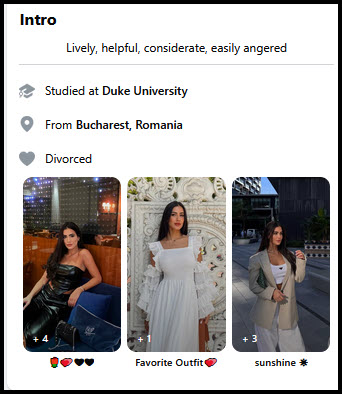A Warning to Professionals and Mature Users
Over the past few years, I’ve noticed a disturbing and increasingly aggressive trend on Facebook — and it’s something more people should be talking about.
As a business professional in my 60s, I’ve always enjoyed connecting with peers, entrepreneurs, and like-minded individuals through social media. But what began as the occasional suspicious friend request has grown into a weekly — sometimes daily — flood of messages from profiles that are almost certainly fake.
At first glance, these profiles often seem legitimate: attractive women claiming to be successful fashion entrepreneurs or investors, often located in major U.S. cities like Los Angeles, New York, or even my home state. Their friend request comes with a soft, seemingly harmless message like:
“I was a little curious when I saw you appear in my friend recommendations, so I added you without knowing why. I hope I didn’t disturb you, and I’m sorry.”
Sounds polite, right? But what follows is anything but innocent.

The Conversation Trap
Once you accept the request or reply, the dialogue begins. And it always follows a pattern:
- They ask about your age, location, and occupation.
- They claim to be “curious” about your business success, and would love to be mentored by you.
- They express a feeling of personal connection with you, and the age difference is never an issue for them.
- They often pivot quickly to discussions about investing, usually in gold or cryptocurrency.
- They try to move the conversation to WhatsApp almost immediately. In one case I forced the communication to a more secure platform “Signal” explaining I can NOT use WhatsApp for privacy reasons. When the “fake profile person” agreed to set up a conversation on Signal, it appeared under a totally different name, which she claimed to be her mother’s account. 🙂
- They never want to speak on the phone, or simply avoid phone conversations where you would be able to have a point of reference or contact info that law enforcement can use against them.
- They often claim to be originally from Europe or Russia, but now live in the U.S.
And if you share anything remotely personal — such as your interests, lifestyle, or family — they latch on and begin chatting with increased frequency. Soon, you’re fielding messages throughout the day.
It’s not just an annoyance — it’s an outrageous waste of time and, worse, a serious threat to your digital privacy.
The Real Danger: Social Engineering
These aren’t lonely hearts looking to connect. They’re part of organized efforts to extract personal data, build psychological profiles, and possibly target victims for fraud, scams, or blackmail.
They want to know:
- What you like and dislike
- Who your family members are
- Whether you have children
- Your exact age
- Whether you own a business
- What you invest in or how you make money
In short, they’re building a digital dossier that can be sold, reused, or exploited in various forms of cybercrime. This is social engineering — not conversation.
Why Isn’t Facebook Stopping It?
Despite Facebook’s vast resources and AI systems, fake accounts continue to flourish. Here’s why:
- Fake profiles are made to look authentic — with real photos (often stolen) and believable bios.
- Scammers send personal 1-on-1 messages that bypass mass-spam filters.
- They exploit the “People You May Know” feature to get into your social circles.
- And Facebook, frankly, has a poor track record when it comes to proactive moderation.

How You Can Protect Yourself
- Don’t accept friend requests from strangers — no matter how attractive or professional their profile looks.
- Watch for scripted messages that seem overly polite or oddly generic.
- Never move conversations to WhatsApp or another messaging platform unless you personally verify the identity.
- Don’t share personal or financial information with anyone online, especially in a first conversation.
- Screen the Friend Request first by looking for these “fake profile” indicators. Small number of friends under 200, and only 1 to 5 friends in common. Beautiful photos that only have 0 to 10 likes and virtually no comments. Remember, the lower the number of connections, friends, likes means they have just recently created the profile (within a year) and not many people interact with them since they do not know them personally.
- Report fake profiles — even if it feels futile. The more reports, the more likely Facebook will take action.
Final Thoughts
The emotional and digital cost of engaging with fake profiles is high — and growing. As someone who values authenticity, privacy, and meaningful connection, I feel it’s important to sound the alarm. As a consumer advocate working with millions of consumers over the past three decades, I find it disturbing that big tech firms such as Facebook are not doing more to reduce, minimize the millions of fake profiles such as these. Business Incentive: Meta has historically favored engagement over safety, and every profile (fake or not) drives activity metrics. Outside of these fake profiles, the more disturbing activity on Facebook is FAKE or Fraudulent Advertisements/Sale. which I have been reporting on for years. I’ll cover this more in another article.
As for new friend requests, or Chat’s initiated by people you do not know, if you’ve experienced this pattern, you’re not alone. Let’s speak out, raise awareness, and help protect each other from this new form of online abuse. Remember, knowledge is KING! Your data is extremely valuable and the more information they have on you, your likes, dislikes, family, locations, age, income, occupations, etc. the more MONEY $$$ the scammers make from their data collection efforts. So even it they are not attempting to get you intimately attached to them, or planning on asking you to invest in their gold or crypto system, they may simply building a profile through the use of AI, Bots and Automated systems, and the next thing you know you have purchased a villa in the south of France that you never knew about. 🙁
Let’s make our future interaction online safe, consumer friendly and profitable… for US, not them! 🙂 I invite you to join me as a member of our FarSuperior communities online, www.FarSuperior.com and learn more about you owning the Internet and not the other way around. God bless and may 2025 be the best year yet for you and yours. Wayne
